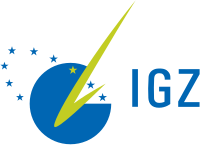Leibniz Institute for Vegetable and Ornamental Crops
| Leibniz Institute for Vegetable and Ornamental Crops | |
|---|---|
 Leibniz Institute for Vegetable and Ornamental Crops |
|
| Category: | research Institute |
| Carrier: | legally independent |
| Legal form of the carrier: | Registered association |
| Membership: | Leibniz Association |
| Facility location: | Large berries |
| Branch offices: | Golzow (Oderbruch) |
| Type of research: | Basic research |
| Subjects: | Natural sciences |
| Areas of expertise: | Agricultural science , biotechnology |
| Basic funding: | Federal government (50%), states (50%) |
| Management: | Eckhard George |
| Employee: | approx. 130 |
| Homepage: | www.igzev.de |
The Leibniz Institute for Vegetable and Ornamental Plant Cultivation (IGZ) eV is an institute of the Leibniz Association . The IGZ conducts basic plant science research with a view to possible applications in vegetable and ornamental plants and in the use of plant biodiversity .
history
The history of the institute goes back to 1924 when, under the direction of Johannes Reinhold, the teaching and research institute for horticulture (LuFa) , Berlin-Dahlem , set up new test fields and an institute for horticultural research in Großbeeren. Until 1949 the institute was part of the teaching and research institute.
When the GDR was founded, the “Central Research Institute for Vegetable Growing” was established in Großbeeren, which subsequently became an institute of the “Academy of Agricultural Sciences of the GDR”.
At the Erfurt location, the ornamental plant research department of the " VEG Saatzucht-Zierpflanzen Erfurt" of the " VVB Saat- und Pflanzgut Quedlinburg" was established, which until 1989 carried out application-oriented research to solve technical, plant-related and crop-specific problems as well as the development of production processes and industrial studies.
After the fall of the Berlin Wall in 1991, both institutions were subjected to an evaluation by the Science Council . Based on the recommendations of the Science Council, the new establishment of the Institute for Vegetable and Ornamental Plant Growing Großbeeren / Erfurt e. V. and inclusion in the joint federal and state research funding as a Blue List Institute . The Erfurt site was given up in 2016 and the Research Center for Horticultural Crops (FGK) was founded there in January 2019, which is now cooperating with the IGZ in Großbeeren.
tasks
Advances in basic research have led to exciting research questions and new analytical methods that can help improve our understanding of plants and their interactions with the environment. The IGZ contributes to these advances and uses them to develop sustainable production systems in horticulture. The IGZ strives for excellence in horticultural research and in related areas of natural and environmental sciences.
One of the aims of the IGZ is to promote the sustainable development of livelihoods in countries and regions with low incomes and insecure living conditions. The work at the institute is interdisciplinary and international, and is largely shaped by third-party funded projects.
The institute's research work is divided into five specialist departments:
- FUNCT Functional Plant Biology: The aim of the work in this program area is to gain a mechanistic understanding of plant functions on various biological organizational levels (from the cell to the plant stand).
- MICRO System Plant-Microbe Systems: This program area analyzes the influence of microorganisms on horticultural crops and the systematic regulation of microbial activity in the environment by plants.
- BIOINF Genomics and Bioinformatics in Horticulture: The research task of the professorship and the BIOINF program area is the establishment, but also the development of new methods and structures to store and process primary 'omics' data and to process this data with each other and with other data, e.g. . B. from the human area or ecosystem biology.
- QUALITY Plant Quality and Food Security: The impact of plants and plant-based food on human nutrition and human wellbeing is heavily dependent on the diversity, composition and quality of plants, as well as on socio-economic factors. This program area studies these interactions and dependencies from a biological, ecological and socio-economic perspective
- HORTSYS Horticultural Systems of the Future (Next-Generation Horticultural Systems): This program area deals with the sustainable use of horticultural crops in cultivation systems, including the development of innovative management strategies for adaptation to climate change.
Scientific Library of the Institute recorded a stock of over 60,000 books and journal volumes and other publications on horticulture , biology , microbiology , ecology , plant nutrition , plant propagation , plant physiology from home and abroad.
organization
The IGZ has the legal form of a registered association (registered association, eV). The funding agencies of the IGZ are the Ministry of Science, Research and Culture (MWFK) of the State of Brandenburg and the Federal Ministry of Food and Agriculture (BMEL; each 50% of the institutional funds). New topics and projects are approved by the IGZ at the suggestion of the general assembly, the scientific advisory board or by scientists of the IGZ at all levels, then discussed in the program areas and finally approved by the board. In addition, demands and recommendations for research topics that are expressed in horticultural practice or in other social groups are discussed and integrated. Institute funds for consumables, small investments and travel expenses are allocated 80% through a performance-based funding system and 20% by the Scientific Director based on strategic priorities.
The administration supports the scientists together with the IGZ's science management team and enables research projects to be carried out on a national and international level. The program areas and the board of directors are jointly responsible for the career development of the staff and for the maintenance of the research infrastructure.
